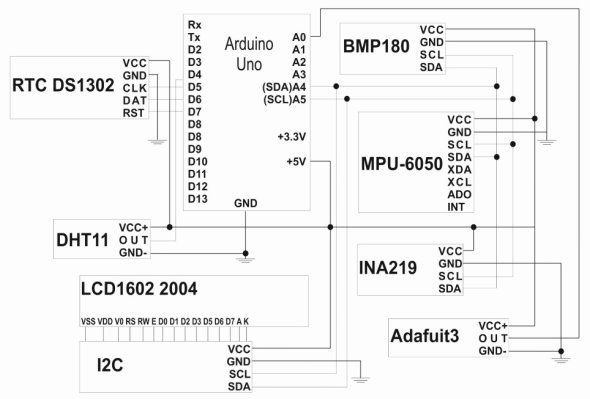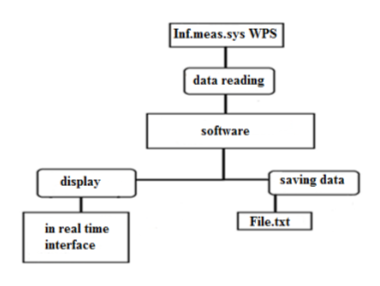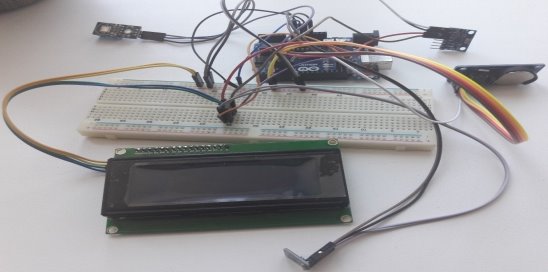The article describes the process of developing an information-measuring system for a sail wind turbine. IN during the operation of the installation with the help of special sensors, it will be possible to obtain performance characteristics in real time.
Keywords: sail, wind power plant, sensor, power supply, information-measuring system.
The head of state in the strategy «Kazakhstan-2050" set the task of developing alternative and renewable types of energy. By 2050, they should account for at least half of the total volume of energy generation. Decree of the President of the Republic of Kazakhstan «On the concept of the transition of the Republic of Kazakhstan to a «green economy» dated May 30, 2013 No. 577, according to which the share of electricity production from renewable energy sources (RES) should be 10 % by 2030 and 50 % by 2050 [1];
In 75 countries of the world in 2017, enterprises purchased 465 terawatt -hours of electricity produced on the basis of renewable energy sources. This amount roughly corresponds to the annual electricity consumption of a country like France, according to the International Renewable Energy Agency (IRENA). A report by an organization called " Corporate Sourcing of Renewables: Marketand Industry Trends " is the first study that summarizes the world's experience in the energy supply of companies in various industries. The study involved more than 2,400 corporations headquartered in more than 40 countries that voluntarily buy renewable electricity and/or build their own generation based on renewable energy. About 200 of them have more than 50 % share of renewable energy in their electricity consumption, and 50 companies have declared 100 % energy supply based on renewable energy sources. 17 % of the companies surveyed have set formal targets for the share of renewable electricity in their energy consumption. The Agency believes that there is significant potential for wider dissemination of the practices under consideration [2].
Efficient use of wind turbines is the most attractive, since the natural balance of energy on the planet is not disturbed and, at the same time, waste-free, environmentally friendly energy production technology is used. Of particular interest is a wind turbine based on rotating cylinders of variable cross section, which can operate efficiently even at low wind speeds [3]. To increase the efficiency of such a wind turbine, it is necessary to study the aerodynamic characteristics of the wind turbine elements — a system of rotating cylinders of variable cross section. Therefore, this problem is relevant both in scientific terms and in terms of practical use.
A review of existing technologies for wind energy shows that in existing, mainly turbine wind farms, the main problem is the unpredictability of wind, wind speed and gusts in short periods of time. This necessitates the adoption of more efficient measures for the production of electricity from wind energy.
Sailing wind turbines have a unique feature — they work equally effectively both at low wind speeds and at high ones due to the dynamically changing shape of the working surface under the influence of the wind flow [4].
The purpose of creating an information — measuring system for a sail wind power plant is to obtain accurate indicators of electricity generation, at certain wind speeds and other parameters necessary for the optimal operation of the installation.
Figure 1 shows an experimental (laboratory) model of a wind farm with a sail working body [5]. For which an information-measuring system was created based on the Arduino UNO platform based on the ATMega 328 microcontroller.

Fig. 1. Experimental layout of a umbrella sail wind turbine: 1 — umbrella sail, 2 — post, 3 — platform, 4 — lower platform, 5 -, 6 — actuators
The developed information-measuring system displays information about the position of the sail along the x, y, z axes and also measures the ambient temperature, air humidity, wind speed, altitude, sail pressure and the generated power of the wind turbine and displays their values on the display.
During the development of software for the information-measuring system of a sail wind turbine, the following technologies were used:
– n lata Arduino;
– Arduino IDE — from the development editor.
Programming language: The program is implemented in the high-level programming language C + +. Sensors were used to assemble the hardware parts, which will determine the necessary data. In this case, data such as temperature, sail pressure, air humidity, sail oscillations in three axes, power, wind speed are read.
Block diagram of the equipment shown in Figure 2.

Fig. 2. Block diagram of the equipment
Ultimately, the information-measuring system will include the following devices:
– Arduino UNO;
– DHT11 — temperature and humidity sensor;
– BMP180 — temperature and pressure sensor;
– LCD1602 — display for displaying data;
– I2C module for display;
– slope sensor (accelerometer, gyroscope);
– jumpers, wires and bradboard.
– adafruitwind speed sensor;
– CJMCU-219current and voltage sensor.
The complete scheme of data movement in the system is shown in Figure 3.
Figure 3 shows the flow of data.

Fig. 3. Scheme of data movement
Data in the system moves as follows. Arduino Uno board reads from DHT 11, BMP180, GY-521, CJMCU-219 sensors and adafruit Anemometer . temperature, humidity, pressure, altitude and position in space, power, wind speed. The data is processed by the board's microprocessor. Data is read from sensors and sent to receiving devices every 2 seconds. After processing the data, the Arduino Uno board sends it to the connected devices. To do this, the current time and date are read from the DS1302 real-time clock module. In addition, the data is also sent to the LED1602 liquid crystal display via a special I2C bus designed for more convenient connection of displays to the Arduino board. In this case, the Arduino board feeds the data received from the sensors to the serial port.
The program for the microcontroller was developed in the programming environment «Arduino IDE». The program performs the following functions:
– reading data from equipment;
– displaying data in the program interface;
– data output to the display (LCD 1602);
Figure 4 shows the main functions of the software

Fig. 4. Scheme of the main functions of the software
After the program has started, the microcontroller will automatically reboot all sensors and devices, and after some time, all the data received from the sensors will be displayed on the display. The data in the fields is updated automatically. Displaying data directly depends on receiving data from sensors. Data transfer occurs every 2 seconds. This interval is programmed on the Arduino Uno board and, if desired, it can be changed by reprogramming the board. When receiving data from the board, the program automatically updates the data in the fields.
Figure 5 shows the process of assembling the elements of the information-measuring system

Fig. 5. Assembly of system elements
When assembling the equipment, a plastic case was used. Holes were made in the case for power contacts for the Arduino board and for connecting a USB wire. Also in the case there is a hole for the display (the screen on which the data from the sensors will be displayed).
Information — measuring system was prepared to obtain experimental data of a sailing wind generator. The system will be useful for conducting research in the field of wind energy for both education and industry.
References:
- Nazarbaev N. A. Strategy «Kazakhstan-2050": a new political course of an established state // Message of the President of the Republic of Kazakhstan — Leader of the Nation N. A. Nazarbayev to the people of Kazakhstan, Astana, December 14, 2012 // http://adilet.zan.kz/ 24.08.2018.
- www.renen.ru 9.04.19
- Nusupbekov B. R., Isembergenov N. T. Creation of a low-speed gearless wind power source. / // Bulletin of KarSU. — 2010. — No. 1. — S. 52–58.
- Sholanov, K. S., Kabanbayev, A., Abzhaparov, K. M. Study and Selection of Parameters of Automatically Controlled Wind Power Station with Swaying Sails // International journal of renewable energy research. — 2020. — Vol. 11. — No. 2. — P. 723–737. — DOI: 10.20508/ijrer.v10i2.10581.g7947.
- Sholanov, K. S., Mirzabayev, B. I., Ceccarelli, M.Expansibility of Electric Power Production by Sail Wind Power Stations // International Journal of Mechanics and Control. — 2021. — Vol. 22. — No. 02. — P. 117–126.

